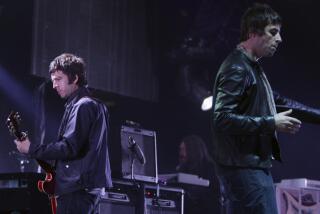Brokers Say They Got Their Springsteen Tickets
- Share via
Los Angeles area ticket brokers said Monday that an elaborate plan to limit their ability to buy and resell tickets to this month’s Bruce Springsteen concerts at greatly escalated prices didn’t work.
Brokers surveyed by The Times said they expect the best seats with a face value of $25.50 to Springsteen’s five Los Angeles Sports Arena shows beginning April 23 are likely to sell for as much as $600 each.
The bulk of the brokers’ tickets are expected to sell for $55-$75.
In the latest round of a continuing controversy over the role of brokers in reselling tickets for major concerts, Avalon Attractions, which is promoting the Springsteen concerts, limited advance word of ticket sales to surprise radio announcements half an hour before priority numbers were given out Friday.
The goal, according to Avalon president Brian Murphy: Keep as many tickets as possible out of brokers’ hands.
About 14,000 tickets to each show were sold to the public on Saturday. It was too early to tell Monday how many tickets were obtained by the dozens of brokers who operate in Southern California.
But Brian Harlig, partner in Good Time Tickets in Hollywood, said his firm ended up with approximately 200 tickets per show--and could have acquired considerably more.
“We could have acquired triple what we got, but we’ll be playing it conservatively because of the short time in which to sell the seats,” said Harlig. Normally, tickets go on sale two months or more before a concert.
“If the goal was to keep the tickets out of our hands, I don’t think it succeeded,” agreed Harris Rosner, owner of the V.I.P. ticket agency in Sherman Oaks.
Repeated telephone calls Monday to Springsteen’s management company in New York were not returned.
But Murphy said he felt that the system was the only practical way to ensure that tickets were distributed fairly.
“We’re aware that there are a lot more people who want to see Springsteen than can,” he said, noting that only 75,000 tickets went on sale Saturday, just a fraction of the 340,000 that were sold for Springsteen’s four 1985 shows at the Los Angeles Memorial Coliseum.
“I knew that not everybody was going to hear those announcements, but our research shows that radio and word of mouth are effective ways to reach the real fans.”
Murphy informed eight Southern California radio stations at 3:30 p.m. Friday that priority wrist bands would be given out at Music Plus/Ticketmaster stores starting at 4 p.m. that day.
When tickets went on sale at 8 a.m. Saturday, only those with untampered wrist bands were eligible to buy them--and in the order indicated on the band. A limit of four tickets per person was imposed. The shows were all sold out by the end of the day.
Some fans, who didn’t learn about the sales system until after the tickets were sold, complained.
Anne Johnson, 46, of Laguna Beach called The Times on Monday to protest the system. She said that she believed it would have been fairer if Avalon had used newspaper or radio ads well in advance of the ticket sale.
Asked why Avalon didn’t follow the normal system of ticket announcements, Murphy said, “In promoting concerts for a number of years, I’m aware that long before the public gets information about ticket sales, the brokers get the information. Our feeling was that (if we ran advance advertisements) all the places at the front of the lines would have been ticket brokers.”
Another reason the normal advance notice was suspended, he suggested, was concern over the safety of fans in view of the expected demand for Springsteen tickets.
Mike Sinclair, 27, heard about the sales plan from a friend and reached a Music Plus store in Pasadena in time Friday to pick up a wristband.
“As far as getting the tickets it was great . . . very orderly,” said Sinclair, who returned to the store Saturday to buy four tickets. “But I be very upset if I hadn’t happened to hear about it. I don’t think the method they used was fair.”
Sinclair suggested a mail order lottery as the fairest way to give everyone a chance at the tickets, but Avalon’s Murphy said that the mail method was an “abject disaster” when employed for Springsteen’s 1980 concerts at the Sports Arena, which Avalon did not promote.
Mail order is, however, the system chosen for ticket sales for Springsteen’s San Francisco Bay Area May 2 and 3 dates at the Shoreline Amphitheatre in Mountain View, Calif.
“We used the wristband system (for Springsteen’s 1985 concerts) and it worked quite well,” said a representative of Bill Graham Presents, which is promoting the Shoreline concerts. “But we used mail order for the Bridge concert (a benefit show featuring Springsteen in 1986), and our feedback from the public was overwhelming for mail order.”
Controversy has surrounded sales of tickets for Springsteen’s concerts dating back to his 1981 tour. On several occasions, the escalated broker fees have brought calls for legislation regulating the allowed surcharges on ticket resales, but the Legislature has never acted on them. Currently, brokers in California are allowed to charge any price.
Even more problems than usual were anticipated for the current tour, as Springsteen chose to return to smaller arenas rather than the stadiums in which he played in 1985.
More to Read
The biggest entertainment stories
Get our big stories about Hollywood, film, television, music, arts, culture and more right in your inbox as soon as they publish.
You may occasionally receive promotional content from the Los Angeles Times.










